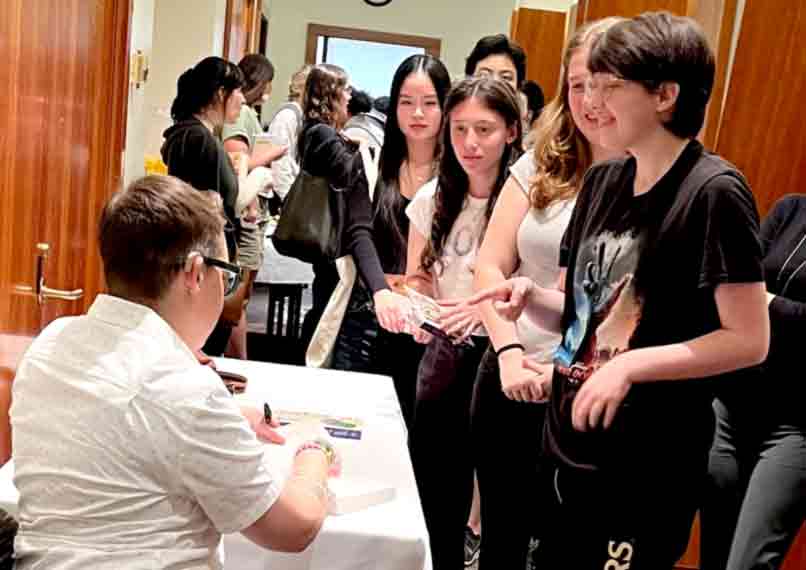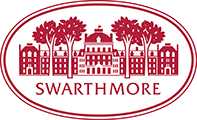True Biz by Sara Nović is one of the most exciting novels I’ve read in years, and that’s saying a lot. I’m a librarian, so while it’s not exactly my job to read a ton of books, let’s say it’s one of my qualifications. True Biz takes place in a high school for the Deaf, and the perspective jumps among characters with starkly different relationships to deafness and Deaf culture. There’s Charlie, a Deaf sixteen-year-old girl who is learning American Sign Language (ASL) for the first time in her life; Austin, whose status as third-generation Deaf makes him a celebrity in the school; and February, headmistress of the school, a child of deaf adults (CODA), raised in ASL and now fighting for the rights, and the future, of Deaf students.
The book combines compelling narrative–by turns funny, exciting, and emotionally devastating–with fascinating information about AS and Deaf history. I enjoyed it so much, it made me wish I knew ASL!
True Biz was the 2023 selection for the Free Library of Philadelphia’s program One Book, One Philadelphia, a city-wide book club that comprises talks, workshops, discussions, and celebrations.The Free Library’s program introduced me to Sara Nović’s book, True Biz—and the fact that she lives nearby! Sara is Deaf, so I had an idea: if we invited her to speak at Swarthmore, could we center a Deaf perspective and Deaf norms of communications? Could we flip the script of a hearing-centric event, where the ASL interpreter stands to the side addressing Deaf members of the audience, and instead make the program easiest to follow for Deaf and Hard of Hearing people, and other people who know ASL?
I connected with colleagues across campus to gather ideas and support. Eventually, a group formed with faculty and staff from the ADA Program in Facilities, the Office of Academic Success, the Office of Inclusive Excellence, ITS, Linguistics, and, of course, the Libraries. The program expanded to include the whole Tri-Co, thanks to the Tri-Co Disability Studies Collective, and the initiative Together with Humanities: Language, Community, and Power. The Free Library of Philadelphia donated four dozen copies of the book for us to distribute across the community. These books supplemented the Libraries’ own copies, available in both print and online
Most importantly, Sara accepted our invitation to come to campus!
We got to work. The group invited Melanie Drolsbaugh, who teaches ASL in Swarthmore’s Linguistics Department, to be Sara’s conversation partner. I worked closely with Melanie to develop questions to guide the interview. We decided to make a slideshow of the questions to help people follow along, a way to prioritize visual language over spoken language.
Sara and Melanie would be speaking to each other in ASL, so we needed to hire interpreters. Luckily, Swarthmore is right down the road from the Deaf-Hearing Communication Centre (DHCC), an organization that advocates for and promotes access, education, and opportunities for the Deaf community in the greater Philadelphia region. (Fun fact: the Executive Director of DHCC, Neil McDevitt, is also the mayor of nearby North Wales, Pennsylvania, the first Deaf person to be elected mayor in the United States!) Typically, an interpreter stands to the side of the speaker and faces the audience. But for our event, we wanted the sign language front and center, so we asked the interpreters to sit facing Sara and Melanie. Colleagues from the Office of Classroom and Conferencing Technologies provided wireless microphones that the interpreters could use, both during the formal conversation, and to pass around to attendees for a question-and-answer segment, which the interpreters would help facilitate.
AV Technology was also crucial for live-streaming the program. Elite educational institutions are not always accessible for Deaf people, indeed for people with many kinds of disabilities. Moreover, representation of stories from within the disability community is rare in the cultural landscape, that’s part of what makes True Biz so special. (For more books by and about people in historically marginalized communities, check out the Libraries’ #OwnVoices collection on Overdrive.)
At Swarthmore, we’re fortunate to have resources to host Sara for such a meaningful event, and we wanted Deaf and Hard of Hearing people in the area to feel welcome. This is why we felt it was important that the program be open to the entire community, and be live-streamed and recorded to accommodate folks who could not easily come to campus. (I am so grateful to Jeff Oaster in ITS for helping me figure out how to do all this, and to Corrine Schoeb for adding captions to the video of the event.)
In the end, all our hard work paid off. More than 75 people attended the event–faculty, staff, and students from all three colleges in the Trico, as well as community members and students from Philadelphia Community College and Princeton University. Plus, the video is available for anyone who wishes to view it. So now I can tell you what everyone who attended the event or watched the video knows: this was a brilliant conversation. As Linguistics professor Donna Jo Napoli wrote to me afterwards, “It was like two stars twinkling at each other in a beautiful night sky.”
And, in the end, my own wish came true. I got to know Melanie Drolsbaugh by working on this project, and now I’m a student in her class, learning ASL.


